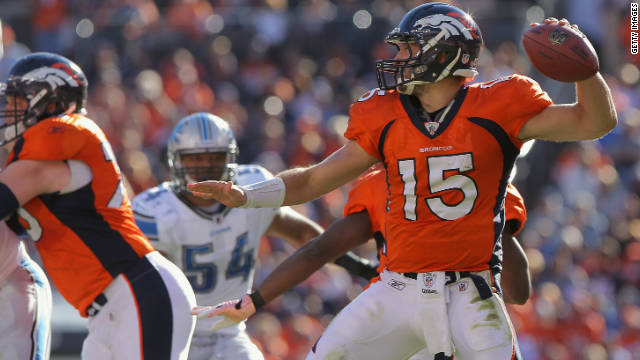Couldn't say it better myself, so I'll just let Mr. Bennett take it from here. Just sorry that it's CNN.com and not on CNN itself.
Don't mock Tim Tebow - CNN.com 2011-12-06T17:02:06Z | CNN.com |

Quarterback Tim Tebow of the Denver Broncos delivers a pass against the Detroit Lions in October in Denver.
Editor's note: William J. Bennett, a CNN contributor, is the author of the newly published "The Book of Man: Readings on the Path to Manhood." Bennett, the Washington fellow of the Claremont Institute, was U.S. secretary of education from 1985 to 1988 and was director of the Office of National Drug Control Policy under President George H.W. Bush.
(CNN) -- Sports loom large in the public's mind today. From the Penn State and Syracuse scandals to the upcoming BCS Bowl Series and the NFL playoffs, much attention is being paid to our athletes and coaches.
These men have enormous impact on the lives of our children, which makes the focus on actions at Penn State and Syracuse universities necessary and the mockery of the actions of honorable men, such as Denver Broncos quarterback Tim Tebow, so disheartening.
Tebow continues to win games. This Sunday he again led the Broncos to victory. He's now 6-1 this year as a starter, the Broncos are in first place in their division, and he has led the team to the most road wins in a row since John Elway.
Tebow is a good man and a good football player. He's a man of character, faith and integrity. He's also a Heisman Trophy winner, a two-time BCS national champion and arguably one of the greatest college football players of all time.
Tebow is a role model for sports fans everywhere. But instead of lifting him up, too many commentators, critics and even fellow athletes mock and deride him and hope that he fails.
The latest example is "Tebowing," where one kneels in prayer with his or her head bent in mockery of Tebow's usual touchdown celebration prayer. Several weeks ago, Detroit Lions' linebacker Stephen Tulloch "Tebowed" after sacking Tebow and Detroit tight end Tony Scheffler "Tebowed" after catching a touchdown against the Broncos.
Critics like to pretend that it's Tebow's football style that bothers them. Tebow hasn't yet proven to be a natural pocket passer, but in his last start he threw for more than 200 yards with two touchdowns, no interceptions and a passer rating near 150, and he continues to lead game-winning drives almost every week. There is always room for healthy criticism in sports, especially at the quarterback position, but Tebow is subject to something uglier. Sportscasters love to take extra shots at Tebow; take Merril Hoge, who at one point tweeted, "It's embarrassing to think the Broncos could win with Tebow!!"
Critics have a problem with who Tebow is as a man. They are bothered by his faith, character and conviction. Jake Plummer, former Broncos quarterback, said in a recent interview, "I wish he'd just shut up." They tell him to take his "holier than thou" faith off the field.
Too many in our culture deride good men such as Tebow because they make them feel uncomfortable. These same critics believe the Aha! theory of human behavior. This theory assumes that the real character of a person is always base and hidden from the eye and that all good actions are a front for ulterior and bad or low motives. Aha! Tim Tebow, you say you're Christian, but we know it's a facade for sympathy and attention. You're just like the rest of us.
C.S. Lewis warned us of this. He wrote in "The Abolition of Man," "We make men without chests and expect from them virtue and enterprise. We laugh at honor and are shocked to find traitors in our midst." We scoff at Tebow and all that he represents and are horrified at the scandals at Penn State and Syracuse. We are right to be horrified, but we shouldn't make fun of our good men.
Men such as Tebow are not in over supply. Despite what his critics say, he should not stop what he is doing. We need men like him, the type of men many fathers would want their daughters to marry and many mothers would want their sons to grow up to be.
Follow
The opinions expressed in this commentary are solely those of William J. Bennett.

No comments:
Post a Comment